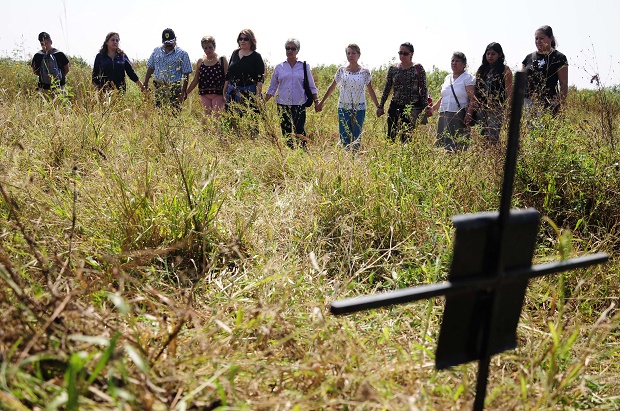Mexican rights agency investigates 150 bodies found in pits

Relatives of missing people hold hands as they stand in an unofficial cemetery that is believed to have been used to bury about 150 bodies of crime victims near the town of Tetelcingo, Mexico, Friday, Nov. 6, 2015. A governmental human rights agency is investigating why the bodies were dumped in this site by state law enforcement agencies lacking the case file markers they are supposed to be buried with, among other anomalies, leading to questions about how they may have died. AP
MEXICO CITY — A state human rights agency said Friday it is investigating why about 150 bodies of crime victims were dumped into pits in central Mexico.
Some of the bodies may have been buried in the mass graves simply to clean out a state morgue. But some of the bodies lacked the case file markers they are supposed to be buried with, leading to questions about how they died.
The grisly discovery in the central state of Morelos has raised questions about whether the case is another example of shoddy police work that denied families the right to recover the bodies of their loved ones, or something even more sinister.
The scandal began when detectives asked relatives of a kidnap victim killed in 2013 to keep his body for further testing. About a year later, the family of Oliver Wenceslao went to retrieve his body but were told it had already been sent to a common grave.
READ: Mass kidnap, killing shakes image of Mexico City
In September, a judge ordered the state prosecutors’ office to exhume Wenceslao’s body and return it to his family.
But investigators, using a backhoe, found they had to dig around about 150 plastic-wrapped bodies in the unmarked pits to get to Wenceslao’s.
“The bad thing is that, during this exhumation, they found several things wrong,” said Rafael Idiaquez, spokesman for the Morelos state human rights commission.
Normally, morgue workers in Mexico prepare bodies headed for common graves by wrapping them in plastic bags. Inside the bag with each body, they put a piece of paper with a case file number written on it. The note is placed inside an empty plastic bottle so that fluids from the decomposing corpse won’t render it illegible.
“There are bodies that don’t have any case file number,” Idiaquez said. “We don’t know why they are there, if they were executed, if they have relatives, if any investigation was ever done in their cases.”
READ: Independent group rejects Mexican gov’t case on 43 missing students
During an inspection visit to the open field in a town east of the city of Cuernavaca on Friday, commission investigator Fabiola Colin said that several procedures and permits required for a potters’ field or common grave were not followed in the case.
Idiaquez said several people have contacted the commission, saying they fear their missing relatives might be in the pit.
Adding to suspicions about the mass graves is the fact that since the 1990s, Morelos has been gripped by a wave of kidnappings and executions, when the Juarez and Beltran Leyva cartels, and later other drug gangs, moved into the state. Several high-ranking states officials have been accused of or convicted for aiding drug gangs.
The Morelos state prosecutors’ office said in a statement Thursday that it condemned the burials and had started internal investigations that could result in criminal charges, possibly including illegal burial and abuse of authority.
The office expressed “its solidarity with the pain of the families of victims whose remains were not treated with respect, or in a lawful manner.”














